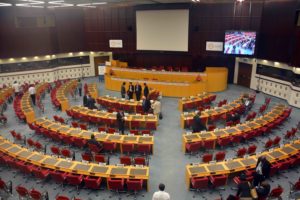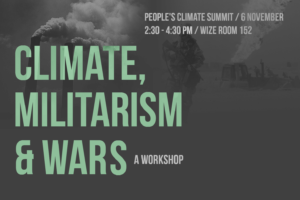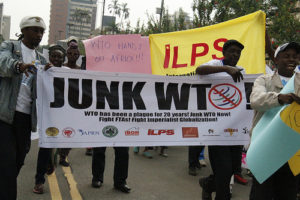Full Text:
Opening Remarks for the OPGA High Level Event on
‘The Contributions of Women, the Young and Civil Society
to the post-2015 Development Agenda’
6 March 2014
By Paul Quintos
Campaign for People’s Goals for Sustainable Development
Excellency John Ashe, distinguished panelists, ladies and gentlemen thank you for this opportunity to share with you today our views and expectations as civil society for a new development framework that members states are currently shaping for the post-2015 era.
A few years ago several internal memos from one of the world’s largest banks, Citigroup, was leaked to the public. The memos described the world’s leading economies as “plutonomies” and advised investors that good returns would be generated from luxury consumption and lifestyles. It also warned against the possibility of rising corporate tax rates that could choke off returns to the private sector, and other taxes on personal income, dividend, capital-gains, and inheritance that could hurt the plutonomy.
It is this model of wealth accumulation that is directly responsible for the crises we now confront. Policies of consumerism, financial speculation, unmitigated exploitation of the world´s resources, privatisation of essential social services, resources and infrastructure, deregulation of labour and economies and militarism have made the world unsustainable, insecure and grossly unequal. The burden of these policies is borne by those least responsible: the impoverished and marginalized, especially women and children in the global south.
How can we maximize the contribution of women to society if they remain tied down by patriarchal structures that require women to carry the burden of the vast amount of the world’s unpaid and low-paid work, if they are being bought and sold as child-bearers, wives and workers while still not respected as equal rights holders? If they are most likely to die in climate related disasters, most likely to be displaced as subsistence farmers, most likely to suffer from the privatization of public services, goods and commons. If women suffer the tyranny of violence inside and outside the home and even internationally where might is normalised as the source of power?
How can youth and children best shape their future if millions are barred from getting an education and fulfilling their potentials? Even those who have degrees are denied decent work opportunities and therefore a life of dignity. Instead we have thousands of girls working in slave-like conditions in factories and plantations and mines or in homes of the better-off; to prop up the avaricious economic structures that demand increased consumption and production to benefit a tiny few.
The Citigroup memo warned that beyond war, inflation, the end of the technology/productivity wave, and financial collapse, the most potent and short-term threat to plutonomies would be societies demanding a more ‘equitable’ share of wealth. That time has come.
Over the past three years, streets and squares and fields across the world have become the sites of massive demonstrations, strikes, occupations, riots, rebellions and revolutions. From the Arab Spring to the movement of the squares in Southern Europe, to Occupy Wallstreet and the streets of Turkey and Brazil, people everywhere are rising up against inequality, injustice, and the lack of accountability of political authorities.
So if there is one clear message that we want our leaders to heed as we move to the negotiating stage of the post2015 agenda, it is this: we need to radically change the global political and economic system through a transformative and redistributive framework that aims to reduce inequalities of wealth, power and resources between countries, between rich and poor and between men and women.
Rhetorical normative language is not enough. Governments must make clear unequivocal commitments to a new course for the world that ensures the planet’s limited resources are used equitably and responsibly, acknowledging the historical debt of the few to the many, and our responsibility to future generations.
We need a goal to redistribute the obscene levels of wealth concentration within and between countries. Indeed, just 5% of the 46.2 trillion-dollar wealth of the world’s so-called “High Net Worth Individuals” is enough to cover the annual cost of a global social protection floor, climate change adaptation and mitigation combined. Targets can be adopted in terms of increasing the share of labor in national income; increasing progressive taxation; democratizing ownership and management of productive assets and finances, expanding solidarity-based and public forms of ownership over the means of production and distribution, strengthening diverse local economies and territorial management.
A strengthened global partnership for development that recognizes the common but differentiated responsibilities of countries is also critical in this regard. Public finance, technology transfers and capacity-building measures should be directed in support of sustainable development effort in developing countries. More importantly, the financial system needs to be fixed including the taxation of speculative flows, clamping down on tax havens, preventing tax competition, cancelling illegitimate and odious debt. The WTO, trade agreements and investment treaties should be circumscribed by human rights norms and principles rather than the other way around.
The respect, protection and fulfillment of human rights should be explicitly recognized as both the overall goal of sustainable development and the means for achieving it. All goals, targets and indicators should be aligned with relevant human rights standards. The immediate obligation to ensure at least essential levels of these rights, without discrimination or retrogression, requires ‘universal’ or ‘zero targets’ for all sectors wherever possible and strong equality benchmarking should be integral to monitoring progress. The duty to use the maximum available resources to fulfill these rights progressively requires monitoring of both the policy and fiscal and budgetary efforts of governments, alongside sustainable development outcomes.
To tackle inequality and injustice we need stricter regulatory frameworks for big business especially transnational corporations to ensure that they are fully transparent, respect human rights and are held accountable whenever they violate these rights. Corporate accountability must not rely on the goodwill and self-regulation of corporations.
Finally, if we want to harness the contribution of women, youth and civil society, the Post-2015 development framework must enhance the enabling conditions for people to claim their rights. The proliferation of new laws, policies and practices that limit core civil society freedoms of expression, association and assembly must be arrested and reversed. Instead, we need to bolster the means and opportunities by which people, especially the most marginalized and excluded, can hold governments, corporations, international institutions, donors and other power-holders to account. We must develop accountability mechanisms from grassroots to the global, community monitoring tools, budget monitor
ing, shadow reports to provide input in monitoring mechanisms, and so on.
ing, shadow reports to provide input in monitoring mechanisms, and so on.
If governments enter into negotiations looking for the lowest common denominator, if you settle for incremental changes that will help the poor but reproduce poverty and injustice, if you do not commit to dismantling the architecture of plutocracy, then people will persevere in demanding development justice – through these channels or through our collective struggles outside the halls of official power.
Thank you. ###
![[WEBINAR] Global Economic Shocks: What’s Happening? Focus on Food, Fuel and Debt](https://iboninternational.org/wp-content/uploads/2022/06/ILPS-COMM-2-Poster-300x200.jpeg)


